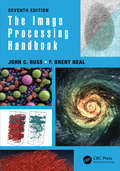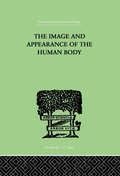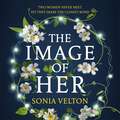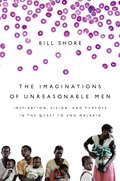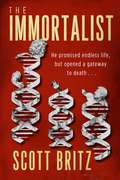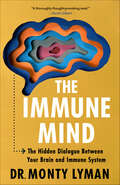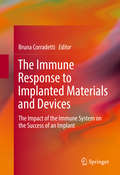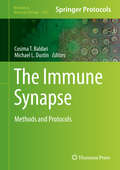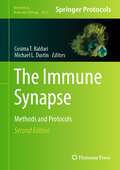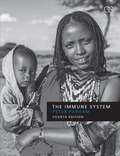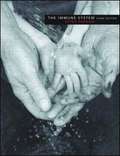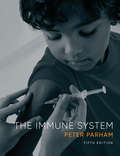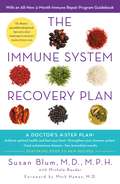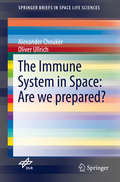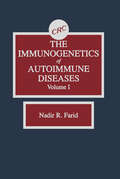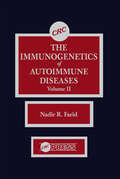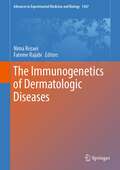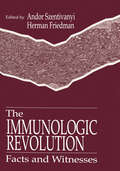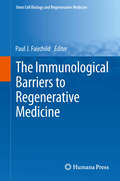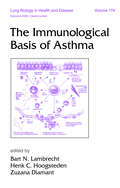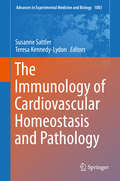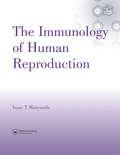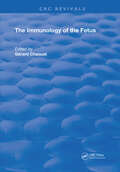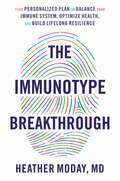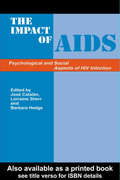- Table View
- List View
The Image Processing Handbook
by John C. Russ F. Brent NealConsistently rated as the best overall introduction to computer-based image processing, The Image Processing Handbook covers two-dimensional (2D) and three-dimensional (3D) imaging techniques, image printing and storage methods, image processing algorithms, image and feature measurement, quantitative image measurement analysis, and more.Incorporating image processing and analysis examples at all scales, from nano- to astro-, this Seventh Edition: Features a greater range of computationally intensive algorithms than previous versions Provides better organization, more quantitative results, and new material on recent developments Includes completely rewritten chapters on 3D imaging and a thoroughly revamped chapter on statistical analysis Contains more than 1700 references to theory, methods, and applications in a wide variety of disciplines Presents 500+ entirely new figures and images, with more than two-thirds appearing in color The Image Processing Handbook, Seventh Edition delivers an accessible and up-to-date treatment of image processing, offering broad coverage and comparison of algorithms, approaches, and outcomes.
The Image and Appearance of the Human Body (International Library Of Psychology Ser. #Vol. 163)
by Paul SchilderFirst Published in 1999. Routledge is an imprint of Taylor & Francis, an informa company.
The Image of Her: The perfect bookclub read to get you all talking
by Sonia VeltonStella and Connie have never met and never will. So why is Stella stalking Connie's every move on social media?Stella lives with her mother, a smothering narcissist. Her world has shrunk since the terrible accident that left her a shut-in. Her days are broken up by deliveries from a courier that she always returns and by the irresistible urge to watch the life of a stranger - beautiful Connie - unfold on social media. But why is she so drawn to a woman she has never met? And what caused the accident she doesn't want to speak about? Connie is an expat living in Dubai with her partner, Mark, and their two children. On the face of it she wants for nothing and yet she fears that her husband is turning into a stranger. When she finds herself drawn into the lives of the local domestic helpers, she discovers that there are dark secrets in this glittering city. Two women with nothing in common except a twist of fate. What happens when their lives collide?
The Imaginations of Unreasonable Men: Inspiration, Vision, and Purpose in the Quest to End Malaria
by Bill ShoreA small cadre of scientists-collaborators and competitors-are determined to develop a vaccine for malaria-a feat most tropical disease experts have long considered impossible. Skepticism, doubt, and a host of logistical and financial obstacles dog their quest. Success may ultimately elude them. Why, and how, do they persist? Bill Shore is a writer, philanthropist, and business leader who knows from personal experience the rare and elusive nature of transformative innovation. In this moving and inspiring book, the story of these uncompromising scientists serves as springboard for his passionate inquiry into the character and moral fabric of those who devote their lives to solving the world’s most pressing and perplexing problems. What does it take to achieve the impossible? It takes whatever it takes.
The Immortalist: A Sci-Fi Thriller
by Scott BritzFor fans of Robin Cook and Michael Crichton comes a medical thriller that melds cutting-edge science with ripped-from-the-headlines terror. What happens when a new immortality drug leads to an explosive outbreak of a deadly virus that, if not contained, could wipe out humanity once and for all?World-renowned virologist Dr. Cricket Rensselaer-Wright abruptly abandoned her research in Africa after watching her colleague die tragically from the Ebola virus. When she returns to the States to reunite with her teenage daughter Emmy, her plans are sidetracked. No sooner does she set foot on the campus of Acadia Springs--the research institute where she grew up and Emmy now lives--than her onetime mentor Charles Gifford announces his discovery of the Methuselah Vector, a gene therapy agent that can confer immortality on a patient after a single injection. Gifford's air of triumph is marred when a young woman on campus dies suddenly from a horrific viral infection, eerily similar to the Ebola that drove Cricket out of Africa. Despite Cricket's pleas to slow down the rollout of the Vector and run more tests, Gifford refuses. And when the unthinkable happens--when Emmy falls ill with the same mysterious disease--Cricket is forced to take matters into her own hands. But is it already too late? Gifford will stop at nothing to release the Vector into the world. Mobs are clamoring for it. Cricket has only a few hours to find a cure for Emmy, and to convince the public that Gifford's quest for eternal life may cost the very lives he hopes to save. **The publisher has provided this ebook to you without Digital Rights Management software (DRM) applied so that you can enjoy reading it on your personal devices.**
The Immune Mind: The Hidden Dialogue Between Your Brain and Immune System
by Monty LymanDelving into the recent discovery of the brain's immune system, Dr. Monty Lyman reveals the extraordinary implications for our physical and mental health.Until a decade ago, we misunderstood a fundamental aspect of human health. Although the brain and the body have always been viewed as separate entities—treated in separate hospitals—science now shows that they are intimately linked.Startlingly, we now know that our immune system is in constant communication with our brain and can directly alter our mental health. This has opened up a new frontier in medicine. Could inflammation cause depression, and could arthritis drugs cure it? Can gut microbes alter your mood? Can something as simple as brushing your teeth properly reduce your risk of dementia? Could childhood infections lie behind neurological and psychiatric disorders such as tics and obsessive compulsive disorder?In The Immune Mind, Dr. Monty Lyman explores the fascinating connection between the mind, immune system, and microbiome. A specialist in the cutting-edge field of immuno-psychiatry, Lyman argues that we need to change the way we treat disease and the way we see ourselves. For the first time, we have a new approach to medicine that treats the whole human being.
The Immune Response to Implanted Materials and Devices
by Bruna CorradettiThis book provides a comprehensive overview of the cascade of events activated in the body following the implant of biomaterials and devices. It is one of the first books to shed light on the role of the host immune response on therapeutic efficacy, and reviews the state-of-the-art for both basic science and medical applications. The text examines advantages and disadvantages of the use of synthetic versus natural biomaterials. Particular emphasis is placed on the role of biomimicry in the development of smart strategies able to modulate infiltrating immune cells, thus reducing side effects (such as acute and chronic inflammation, fibrosis and/or implant rejection) and improving the therapeutic outcome (healing, tissue restoration). Current cutting-edge approaches in tissue engineering, regenerative medicine, and nanomedicine offer the latest insights into the role immunomodulation in improving tolerance during tissue transplant in the treatment of orthopaedic, pancreatic, and hepatic diseases. "Immune Response to Implanted Materials and Devices" is intended for an audience of graduate students and professional researchers in both academia and industry interested in the development of smart strategies, which are able to exploit the self-healing properties of the body and achieve functional tissue restoration.
The Immune Synapse
by Cosima T. Baldari Michael L. DustinThis volume provides all the essential protocols that are currently used to study the immune synapse. Chapters in The Immune Synapse: Methods and Protocols cover methods for the study of the dynamics of immune synapse assembly, traffic at the immune synapse, new high resolution imaging, biophysical and computational methods for the study of the immune synapse, effector immune synapses, B cell, NK and mast cell immune synapses, and immune interactions in vivo. Written in the highly successful Methods in Molecular Biology series format, chapters include introductions to their respective topics, lists of the necessary materials and reagents, step-by-step, readily reproducible laboratory protocols, and tips on troubleshooting and avoiding known pitfalls. Authoritative and practical, The Immune Synapse: Methods and Protocols will be of interest to immunologists and, at a more general level, to cell biologists, biophysicists and computational biologists.
The Immune Synapse: Methods and Protocols (Methods in Molecular Biology #2654)
by Cosima T. Baldari Michael L. DustinThis new collection features the most up-to-date essential protocols that are currently being used to study the immune synapse. Beginning with methods for making biophysical measurements, the volume continues by covering the cell biology of synapses, methods for advanced substrate engineering, mechanobiology topics, new technologies to describe and manipulate synaptic components, as well as methods related to sites of action and immunotherapy. Written for the highly successful Methods in Molecular Biology series, chapters include introductions to their respective topics, lists of the necessary materials and reagents, step-by-step and readily reproducible laboratory protocols, and tips on troubleshooting and avoiding known pitfalls. Authoritative and fully updated, The Immune Synapse: Methods and Protocols, Second Edition serves as an ideal practical guide for researchers working in this dynamic field. Chapters 5, 11, 18, 27, 30, and 32 are available open access under a Creative Commons Attribution 4.0 International License via link.springer.com.
The Immune System
by Peter ParhamThe Immune System, Fourth Edition emphasizes the human immune system and presents immunological concepts in a coherent, concise, and contemporary account of how the immune system works. Written for undergraduate, medical, veterinary, dental, and pharmacy students, it makes generous use of medical examples to illustrate points. This classroom-proven
The Immune System (3rd edition)
by Peter ParhamParham (structural biology, microbiology, immunology, Stanford U.) offers a third edition to his textbook explaining the functions of the human immune system. It is specifically intended for undergraduate students in medical, dental, and pharmacy in immunology courses. Extensively updated, the textbook includes new chapters on innate and adaptive immunity, enhanced treatment of aspects of innate immunity such as the complement system and defensins, immunotherapies, and the nature of immune response in mucosal tissues and immunological memory. It is well-illustrated and includes essay, multiple choice, and case study questions at the conclusion of each chapter. Annotation ©2009 Book News, Inc., Portland, OR (booknews.com)
The Immune System (Fifth Edition)
by Peter ParhamA thoroughly updated introduction to immunology. The Immune System is a concise yet thorough human-oriented introduction to how the human immune system works. It provides an up-to-date presentation of the field, written in an accessible style, replete with relevant medical examples. Plentiful illustrations and micrographs complement and illuminate the explanations. This purchase offers access to the digital ebook only.
The Immune System Recovery Plan: A Doctor's 4-Step Program to Treat Autoimmune Disease
by Dr Susan Blum M.D., M.P.H"The Immune System Recovery Plan is the right book, at the right time, by the right person. We are witnessing a significant increase in autoimmune inflammatory diseases, which include more than 80 different diagnoses. Dr. Blum has done a magnificent job helping the reader to understand how this family of inflammatory disorders, including arthritis and fibromyalgia, can be managed with the diet and lifestyle program she developed in her practice. Her step-by-step approach is based on her considerable years of experience as a physician, and the emerging medical science that, for the first time, has developed an understanding of how genetics, lifestyle and nutrition play a role in origin of these disorders. The approach described in Dr. Blum's book represents the leading edge in the lifestyle management of chronic inflammatory disorders. It is a 'news to use' book that provides real assistance to those with inflammatory disorders who are looking for a clinically sensible approach to their problems." (Jeffrey Bland, Ph.D., FACN, President, Personalized Lifestyle Medicine Institute)The innovative four-step method in this book focuses on:Using food as medicineUnderstanding the stress connectionHealing your gut and digestive systemOptimizing liver functionEach of these sections includes an interactive workbook to help you determine and create your own personal treatment program. Also included are recipes for simple, easy-to-prepare dishes to jump-start the healing process.The Immune System Recovery Plan is a revolutionary way for people to balance their immune systems, transform their health, and live fuller, happier lives.
The Immune System in Space: Are we prepared?
by Alexander Choukèr Oliver UllrichThis book gives insight into the mechanism of the immune system and the influence of the environment on earth. Further, the book explains the changes that occur in our immune system in the absence of gravity and their fundamental consequences. Several limiting factors for human health and performance in microgravity have been clearly identified as an unacceptable risk for long-term and interplanetary flights. Serious concerns arose whether spaceflight-associated immune system dysfunction ultimately precludes the expansion of human presence beyond Earth's orbit. The immune system has undergone many evolutionary steps to cope with a new and changing environment, but `space` has not been evolutionary experienced before. Through endocrine orchestration of cell functions, cell to cell communications and intracellular mechanisms the human body and his immune system have an enormous capacity to adapt and react to altered environmental conditions. Thus, the special sensitivity to altered gravity renders the immune system an ideal biological model system to understand if and how gravity on Earth is required for the normal function of cells and cellular networks. It is one of the most fundamental challenges to find out, if our organism and our cellular machinery are able to live and to adequately perform without the gravity field of Earth. The book is written for immunologists and researchers in human physiology under normal and stressfull conditions.
The Immunogenetics of Autoimmune Diseases, Volume I
by Nadir R. FaridMany developments in immunology have occurred over the past 10 years that give us a better understanding of the immune system and its dysfunctions. Refined mapping of the major histocompatibility complex MHC; elucidation of its gene structure and polymorphism, as well as the molecular basis of MHC restriction; the arrangement, expression, and regulation of immunoglobulins; definition of the structure of the T cell receptor and organization of its genes; and the characterization of soluble factors involved in cell/cell interactions and cloning of their genes are among the major accomplishments. Volumes I and II build on these developments in basic immunology to introduce animal models of various diseases, corresponding human studies, and the genetic analysis of autoimmune traits at the patient population level. The book will be a tremendous asset to immunologists, geneticists, and physicians in various areas of clinical subspecialties.
The Immunogenetics of Autoimmune Diseases, Volume II
by Nadir R. FaridMany developments in immunology have occurred over the past 10 years that give us a better understanding of the immune system and its dysfunctions. Refined mapping of the major histocompatibility complex MHC; elucidation of its gene structure and polymorphism, as well as the molecular basis of MHC restriction; the arrangement, expression, and regulation of immunoglobulins; definition of the structure of the T cell receptor and organization of its genes; and the characterization of soluble factors involved in cell/cell interactions and cloning of their genes are among the major accomplishments. Volumes I and II build on these developments in basic immunology to introduce animal models of various diseases, corresponding human studies, and the genetic analysis of autoimmune traits at the patient population level. The book will be a tremendous asset to immunologists, geneticists, and physicians in various areas of clinical subspecialties.
The Immunogenetics of Dermatologic Diseases (Advances in Experimental Medicine and Biology #1367)
by Nima Rezaei Fateme RajabiThis book intends to investigate the broad spectrum of genetic changes in immunological processes involved in cutaneous diseases. One of the main goals of immunogenetic studies is finding susceptibility genes for complex diseases. This can provide an insight into the pathogenesis of the condition in a way that is not easily achievable through other kinds of studies. Thus they are a rational initial step for generating hypotheses about disease pathogenesis. This may especially benefit dermatology, a field notorious for having too many diseases with unknown etiologies.Immunogenetic investigations have made targeted treatment strategies possible for diseases such as psoriasis and pemphigus. Even though these strategies have revolutionized the management of chronic dermatological conditions such as psoriasis, still there are a lot of unanswered questions. For instance, psoriasis patients respond very differently to each of the commercially available biological agents. This diversity could be partially explained by the differences in the sets of genes responsible for disease induction in each individual. Thus whole genome sequencing strategies, if feasible at individual levels, might help in tailoring these targeted treatments based on specific genetic backgrounds.Our intention in preparing this book was to explore the broad spectrum of the genetic aspects of immunological processes involved in cutaneous diseases. We have tried to cover most areas of dermatology where enough studies were available to gather a chapter. Still, there is a substantial lack of knowledge on the immunogenetics of many dermatological conditions. We hope that this book would encourage the investigators to fill these gaps of knowledge.
The Immunologic Revolution: Facts and Witnesses
by Herman Friedman Andor SzentivanyiThis unique volume contains reviews by some of the most prominent immunologists in the world. The authors present vital facts for each of their areas of expertise and provide individual perspectives on how their own contributions were developed and how these contributions influenced general immunological thinking and development. This impressive collection of personal reviews by these internationally renowned immunologists makes The Immunologic Revolution an important and lasting contribution to the entire biomedical community.
The Immunological Barriers to Regenerative Medicine
by Paul J. FairchildThis volume offers an analysis of the scale and nature of the immunological issues facing regenerative medicine, drawing on the expertise of laboratories around the world who have taken up the challenge of applying their expertise in immunology to the vagaries of stem cell biology. In Part I, we explore the extent to which the principles of allograft rejection, learned over several decades from our experiences of whole organ transplantation, apply within the unique context of cell replacement therapy. Part II discusses various innovative ways of addressing the issues of immunogenicity, while, in Part III, we focus exclusively on the induction of immunological tolerance through a variety of novel approaches. It is our hope that this systematic analysis of the current state of the field will galvanise efforts to solve an issue which has so far remained intractable.
The Immunological Basis of Asthma
by Zuzana Diamant Bart N. Lambrecht Henk C. HoogstedenThis text assesses the role of dendritic cells, T and B lymphocytes, epithelial and mast cells, eosinophils, neutrophils, macrophages, and their products in the initiation and progression of airway inflammation, regulation, and repair. It unveils advances in immunology and cell biology to generate new therapeutic regimens for inflammatory and aller
The Immunology of Cardiovascular Homeostasis and Pathology
by Susanne Sattler Teresa Kennedy-LydonCardiovascular immunology is a newly emerging research area, investigating the crosstalk between the cardiovascular and the immune system. This crosstalk is evident through (1) crucial immunological capacities and functions of cardiovascular cell types, including cardiomyocytes, fibroblasts, endothelial cells, pericytes and cardiac resident macrophages, (2) the impact of aberrant immune function on the development of cardiovascular disease such as atherosclerosis, direct and indirect immune-mediated heart disease and vasculitis, and (3) the crucial role of the immune system in cardiac repair and regeneration. The Immunology of Cardiovascular Homeostasis and Pathology covers all these aspects of cardiovascular immunology, starting with homeostatic immunological functions of traditional cardiovascular cell types, and moving then to the role of the immune system in cardiovascular pathology and to recent research into targeting the immune system to boost cardiac healing and regeneration.
The Immunology of Human Reproduction
by Isaac T. ManyondaUnderstanding immunology is increasingly important in obstetrics and gynecology. Written primarily to meet the needs of practicing obstetricians and gynecologists, this book explores the role of immunological processes in reproduction. It presents immunologic concepts and illustrates important points with examples familiar to the clinician. The boo
The Immunology of the Fetus (Routledge Revivals)
by Gerard ChaouatFirst published in 1989, this book provides information on the diagnosis and treatment of neonatal immunodeficiencies. It includes a survey on the "riddle of the fetal allograft". Also discussed in the text are Ontogeny, immunological aspects of differentiation, and treatment of spontaneous abortion. This book is useful to predoctoral students, researchers in obstetrics, animal husbandry, and reproductive immunology.
The Immunotype Breakthrough: Your Personalized Plan to Balance Your Immune System, Optimize Health, and Build Lifelong Resilience
by Heather ModayA respected immunologist, allergist, and functional medicine doctor breaks down the latest science on immunity, offering &“the most important guide available&” (Mark Hyman, MD) to balancing your system for optimal health and longevity.To most of us, the immune system is seemingly unknowable—it's an invisible, complex network of cells, receptors, and messengers, and there's no standard way to see if it's functioning as it should. Yet in spite of this, it affects every aspect of our health, influencing (and sometimes even causing) nearly every disease known to humanity. Much has been made about &“boosting&” immunity, but what exactly does that mean, and what if boosting isn't really what your unique system needs? In The Immunotype Breakthrough, Dr. Heather Moday explains that for most, immune system balance is key. Drawing on a wealth of cutting edge research and fascinating case studies, Dr. Moday explains that the immune system is fluid and significantly influenced by our behaviors, diet, habits, and environment. She identifies four primary Immunotypes—Smoldering, Weak, Hyperactive, and Misguided—that underlie the immune imbalances that commonly lead to disease, chronic inflammation, infection, allergies, and autoimmunity. By identifying your personal immunotype—where you fall on this immunity spectrum—you can intervene by making focused, individualized, natural lifestyle changes to ensure it functions optimally Featuring engaging and accessible science, practical and customizable takeaways, and interactive quizzes to help you zero in on your specific needs, The Immunotype Breakthrough is a revolutionary program for creating an individualized lifestyle and diet that will lead to immune resilience, vitality, and longevity.
The Impact of AIDS: Psychological and Social Aspects of HIV Infection
by Jose Catalan Barbara HedgeThis volume contains a selection of key contributions to the discussion on the psychological and social implications on HIV infection. It contains up-to-date and authoritative papers by senior practitioners and researchers in the field of the psychological and social aspects of HIV infection. The book will appeal to those involved in providing care
